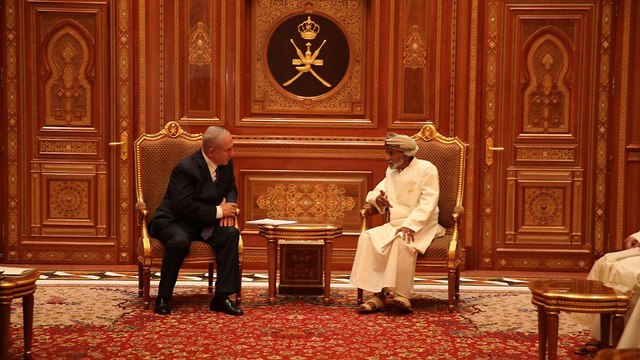As reported by Thomson Reuters, November 27, 2018:
Israel said on Tuesday that it and Chad would resume relations, severed in 1972, after the central African country's President Idriss Deby made a surprise visit to Jerusalem this week.As reported by Itamar Eichner of Ynet News, November 26, 2018 (links in original):
After Deby wound up his two-day visit, Israel said in a statement that Prime Minister Benjamin Netanyahu would "visit Chad soon and announce, with the Chadian president, the renewal of ties." No date was given.
Chad is a Muslim-majority country, and most Muslim or Arab countries do not have formal ties with Israel.
Some African countries have kept their distance from Israel since its occupation of the Palestinian territories in the 1967 Middle East war, but the Netanyahu government has been keen to improve relations with the continent.
Some Sunni Muslim countries have also drawn closer to Israel in recent years due to shared concerns about the rise of Shia power Iran.
Meeting in Jerusalem, Netanyahu and Deby "discussed shared threats and the struggle against terrorism" as well as co-operation in agriculture, solar energy, water security and health, the statement from the Israeli premier's office said.
Netanyahu has cited Chad's renewed relationship with his country as an example of how Israel can make diplomatic inroads in Africa and in the Middle East despite its ongoing conflict with the Palestinians.
Israel is working to establish diplomatic ties with the Gulf State of Bahrain, which are expected to be announced soon.As reported by Tovah Lazaroff of the Jerusalem Post, October 26, 2018:
Prime Minister Benjamin Netanyahu hinted at contacts being held with the Muslim country during his joint press conference with Chadian President Idriss Deby on Sunday.
"A few minutes ago, we discussed in my office the great changes that are taking place in the Arab world in its relations with Israel. And this was manifested in my recent visit in Oman with Sultan Qaboos. And there will be more such visits in Arab countries very soon," Netanyahu said.
The Persian Gulf State, which has a population of 1.4 million, does not have diplomatic relations with Israel. Bahrain has a small Jewish community of 40 people, and it is the only state in the Persian Gulf with a synagogue.
Several Bahraini Jews hold key positions in the country. Huda Ezra Ibrahim Nunu, a Bahraini Jewish woman, served as Bahrain's ambassador to the US between the years 2008-2013. Attorney Nancy Dina Kadouri is of Jewish descent, and serves as one of the members of the upper house of the National Assembly in Bahrain, whose members are appointed by the king.
After Netanyahu returned from Oman last month, officials in Jerusalem said the next Arab country to host Netanyahu would be Bahrain.
As with Bahrain, Israel and Oman do not have diplomatic relations. The meeting was the first between the leaders of the two countries since 1996. In 2000, with the outbreak of the second intifada, Oman severed its ties with Israel.
Over the past several years, the media has reported on secret communications between Israel and Oman, with one report indicating that Israel was about to open a secret consulate in the port city of Muscat.
As part of the US administration's efforts to set in motion a political process between the two countries, the Americans worked to convince Oman to normalize its relations with Israel.
In the past, the Sultanate announced it would resume diplomatic relations with the Jewish State, if the latter agrees to freeze construction in the settlements.
Prime Minster Benjamin Netanyahu on Friday made a surprise visit to Oman, an Arab Muslim state which has no diplomatic ties with Israel.
He did so at the invitation of the country’s leader Sultan Sayyid Qaboos bin Said Al Said, so that the two men could discuss regional issues.
Netanyahu was in Oman, just two days after a Palestinian delegation led by Palestinian Authority President Mahmoud Abbas was in Oman. Abbas also met with Sultan Qaboos.
The visit comes amidst the possible break through in Egyptian efforts to restore calm between Israel and Hamas over Gaza and the pending release of US President Donald Trump’s long waited peace plan.
The last such Israeli visit occurred in 1996, when former prime minister Shimon Peres, traveled to Oman to meet with the sultan and to open an Israel Trade Representation office, which was shut four years later, after the start of the Second Intifada in October 2000. The economic ties never reached the level of full diplomatic relations.
Netanyahu has long argued that the Arab world is open to normalized economic ties with Israel, even in advance of any resolution to the Israeli-Palestinian conflict.
After Friday’s visit the Prime Minister’s Office said, “Netanyahu's visit is a significant step in implementing the policy outlined by Prime Minister Netanyahu to strengthen ties with the countries of the region, while leveraging Israel's advantages in security, technology and the economy.”
Netanyahu and the Sultan talked about “ways to advance the peace process in the Middle East and discussed a number of issues of mutual interest for peace and stability in the Middle East,” the PMO said.


.JPG)



































No comments:
Post a Comment